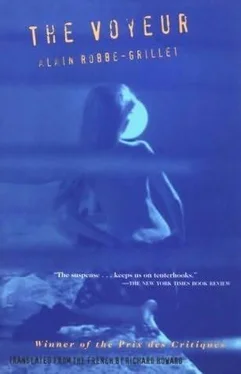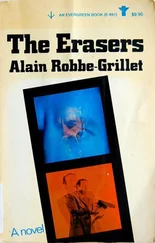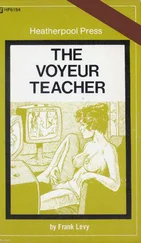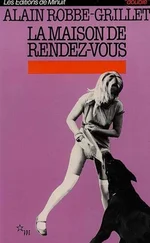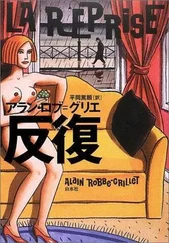He closed his suitcase and headed toward the back of the room. Instead of leaving by the door behind the bar, he had been directed to another exit, a doorway in the corner where the pin-ball machine stood.
When the door closed behind him, he was standing in a rather dirty vestibule dimly lighted by a little glass door opening on an interior court, itself deep and dark. The walls around him, once painted a uniform yellow-ochre, were filthy, scaling, scored, even split in places. The wood of the floors and stairs, although evidently as worn by frequent washing as by the passage of feet, was black with encrusted grime. Various objects were piled in the corners: cases of empty bottles, large boxes of corrugated cardboard, a washing-machine, fragments of cast-off furniture. It was apparent they had been stored with a certain system, and had not accumulated merely in successive rejections. Furthermore, nothing was actually dirty; everything seemed quite ordinary: it was obvious that the floorboards simply had not been waxed (which, after all, was not surprising) and that the walls needed repainting. As for the dead silence, that was much less depressing—and more justified—than the virtually mute tension that filled the café from one moment to the next.
A narrow hallway turned off to the right, doubtless leading to the room behind the bar and, farther on, to the quay itself. There were also two stairways, one as narrow as the other—it was difficult to account for both, since they did not appear to lead to different wings of the building.
Mathias was to take the one directly in front of him as he came out of the café; to a certain degree either stairway might have fit this description, although neither of them satisfied it altogether. He hesitated a few seconds and ended by choosing the one farthest from him because the other was distinctly recessed in the wall. He walked up one flight. Here he was confronted by two doors—as he had been told—one with no knob.
The second was not closed, but merely resting against the jamb. He knocked without pressing too heavily, lest the door open completely, for he could feel that it would turn on its hinges at the slightest pressure.
He waited. There was not enough light on the landing for him to tell whether the door was painted to imitate the texture of wood, or else spectacles, eyes, rings, or a whorl of thread rolled into a figure eight.
He knocked again, this time with his ring. As he feared, the door opened by itself. Then he realized that it led only to another vestibule. After waiting again he stepped forward, no longer certain where to knock. There were now three doors in front of him.
The one in the middle was wide open. What it presented to view was not the kitchen described by the proprietor, but a spacious bedroom that surprised Mathias by its resemblance to something he could not later identify. The entire center of the room had been cleared so that the black and white tile flooring was immediately noticeable: white octagons the size of plates, adjacent on four of their sides and thus providing for an equal number of smaller black squares between them. Mathias then recalled that it was an old island custom to lay tiles rather than floorboards in the finest rooms of the house—but more often in the dining room or the living room than in a bedroom. Yet this room left no doubt about its function: a large, low bed filled one of its corners, its long side against the wall facing the door. Against the wall at the right, perpendicular to the head of the bed, a night table supported a bed lamp.
Next came a closed door, then the dressing table over which hung an oval mirror. A bedside rug made of lambskin completed the furnishings of this corner. To see farther along the wall at the right he would have had to put his head all the way into the room. Similarly, the whole left side of the room remained concealed by the door to the vestibule where Mathias was standing.
The tiles on the floor were perfectly clean. No mark soiled the white, dull, even, apparently new tiles. The whole room had a neat, almost coquettish look (despite a certain strangeness) in contrast to the appearance of the stairs and the hallway.
The tiling alone could not account for the rather unusual character of the room; its colors were quite ordinary and its presence in a bedroom was easily explained: for instance, as a result of a modification of the entire apartment which had caused the functions of certain rooms to be exchanged. The bed, the night table, the little rectangular rug, the dressing table with its mirror were all popular styles, as was the wallpaper of tiny, many-colored bouquets printed on a cream-colored background. Over the bed, an oil painting (or a vulgar reproduction framed as if it were a masterpiece) showed the corner of a room just like the one in which it hung: a low bed, a night table, a lambskin. Kneeling on the lambskin and facing the bed, a little girl in a nightgown is about to say her prayers, bending her head over her clasped hands. It is evening. The lamp illuminates, from a forty-five-degree angle, the child’s neck and right shoulder.
On the night table, the bed lamp had been turned on—forgotten; the daylight, barely obscured by a simple voile curtain, had prevented Mathias from noticing it right away, but the conical lamp shade was unmistakably illuminated from within. Just beneath it shone a small blue rectangular object—which must have been a pack of cigarettes.
Although the rest of the room seemed orderly enough, the bed looked as if it had been the scene of a struggle, or were in the process of being changed. The dark red bedspread had been rumpled and trailed along the tiles on one side of the bed.
A mild warmth emanated from the room, as if something were still burning in the fireplace, even at this time of year—something not visible from the open door of the vestibule where Mathias was standing.
Toward the other end of the landing was an empty garbage pail and, farther on, two brooms leaning against the wall. At the foot of the stairs he decided not to take the narrow hallway which—he assumed—would lead directly back to the quay. He returned to the café which was now quite empty. He quickly reassured himself: no one would have bought anything, neither the sailors, nor the proprietor, nor the girl with the timorous expression who was probably not in the least timorous, nor awkward, nor even obedient. He opened the glass door and was once again out on the uneven cobbles in front of the sparkling water of the harbor.
The weather was even warmer now. His wool-lined duffle coat began to feel heavy. It was really a lovely day for April.
But he had already wasted too much time and did not loiter warming himself in the sunshine. Turning his back on the edge of the quay overhanging the exposed strip of mud strewn with crabs and dismembered pincers, toward which he had just taken a few steps while thinking of something else, Mathias returned to the row of housefronts and to the uncertain exercise of his profession.
A reddish shop-front.… A glass door…. He turned the handle mechanically and found himself in the next shop, which had a low ceiling and was darker than its neighbors. A customer, leaning on the counter opposite the saleswoman, was checking a long bill which the saleswoman was adding up on a very small rectangle of white paper. He said nothing lest they lose their place in the calculation. The shopkeeper, who was murmuring her figures in an undertone while following them with the point of her pencil, interrupted herself for a moment to smile at the new customer and to ask him, with a gesture of her hand, to be patient. She immediately plunged back into her calculations. She went so rapidly that Mathias wondered how the customer managed to check her figures. Besides, she must have been quite inaccurate, for she started the same series of numbers several times, and could not seem to reach the end of it. Having said “forty-seven” more loudly, she wrote something on the paper.
Читать дальше
